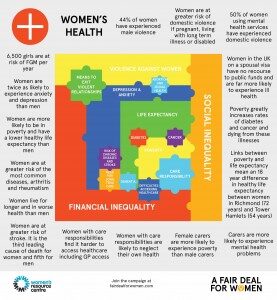
****Vital updates to this page coming soon! Look out for ‘Fair Deal for Women Report – Part 2: Women Speak Out on Safety Justice and support and Women’s Health’****
We know that women live longer lives, and the perception seems to be that women are healthier precisely because they live longer. However, research shows that women live the duration of their lives in considerably worse health than men.
There are a variety of social factors that contribute to women’s poor health. These include:
- low income and higher likelihood of living in poverty
- physical and sexual violence
- care responsibilities for children and the elderly
As a result, women are at a higher risk of:
- depression and anxiety
- cancer
- dying from diabetes
- stress related high blood pressure
- eating disorders and self-harm
- HIV and AIDS
- and women are more at risk of stroke and chronic diseases including arthritis and rheumatism
 click for full sized infographic
click for full sized infographic
Sources
Specialist services are run by women’s organisations, offering a range of services from support with mental health issues to reproductive rights support, to therapeutic, counselling and alternative therapies. Support is also provided for women with specific needs, for example deaf women’s associations.
The Women’s Health and Equality Consortium
The Consortium, led by the Women’s Resource Centre, is a strategic partner of the Department of Health. It comprises: Positively UK, Maternity Action, FORWARD UK, Rape Crisis England and Wales, Imkaan, and the Women’s Resource Centre. Together these organisations do crucial work to influence policy to make sure that the specific needs of women and girls are met.
What can Parliament do?
- Ensure proper investment in prevention
- Tackle the health inequalities that women and girls face with a national framework
- Ensure that the evidence used to develop health policy is grounded in the specific experiences of women and girls
Sources
Share on FacebookShare on Twitter
